Bob Hawke biography: Former PM’s insatiable appetite for sex and affairs
A new biography of former PM Bob Hawke has thrown a light on the womanising side of him it seems everyone but the voting public knew about. READ OUR EXCLUSIVE EXTRACT.
NSW
Don't miss out on the headlines from NSW. Followed categories will be added to My News.
Bob Hawke went off the grog when he entered parliament, and did not drink alcohol during his prime ministership, but he did not relinquish his insatiable appetite for sex with women he was not married to. He maintained relationships with several women in different cities. When Hawke rolled into a capital or regional city, some women would ring his office to let him know they were available. He had a steady group of women who satisfied his sexual needs. “While he was prime minister, there were about four women he was having serious affairs with,” acknowledged Blanche d’Alpuget. And he had affairs at the Lodge.
He is not the only prime minister to risk his integrity with dangerous liaisons. Australian politics in the 1960s and 1970s sizzled with stories of extramarital affairs, sexism and harassment. Hawke was a serial adulterer before and after he became prime minister in 1983. Some women threw themselves at him, mesmerised by his charisma and power, and others he flatly propositioned. When rejected, he would lash out and often humiliate them. He could be selfish and careless.
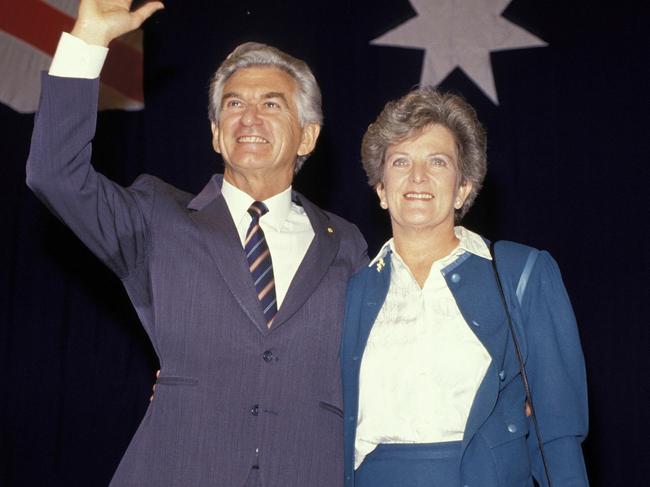
Hawke is the only prime minister to admit his infidelity while prime minister. In 1989, he was interviewed by Clive Robertson on his Newsworld program. Asked about his womanising, Hawke said: “I was unfaithful to my wife.” Robertson followed up: “Did you stop that?” Hawke replied: “Yes.” This was not true. Hawke explained that Hazel knew about the infidelity. “She understood that it was part of a pretty volatile, exuberant character, and she knew my love for her had never changed,” he said. Hawke’s eyes filled with tears. “I have always loved Hazel, and always will.”
John Brown, the minister for tourism between 1983 and 1987, spent a lot of time with Hawke. “When he was prime minister, he was terribly indiscreet, and how he got away with it I don’t know,” said Brown. “He always wanted to talk to me about girls.” Brown was known as the “Minister for Good Times”: he famously had sex with his wife, Jan, on his ministerial desk in West Block in 1983. She left her “black lace perfumed knickers” in his departmental head’s ashtray on the way out. When the Sydney Sun revealed the story in 1987, Hawke rang Brown. “Mate, what would you have done if you had fallen off the desk?” he asked, laughing hysterically. “This is the funniest thing I’ve ever seen.” A satirical note was circulated among ministerial offices warning of the dangers of having sex at desk level.
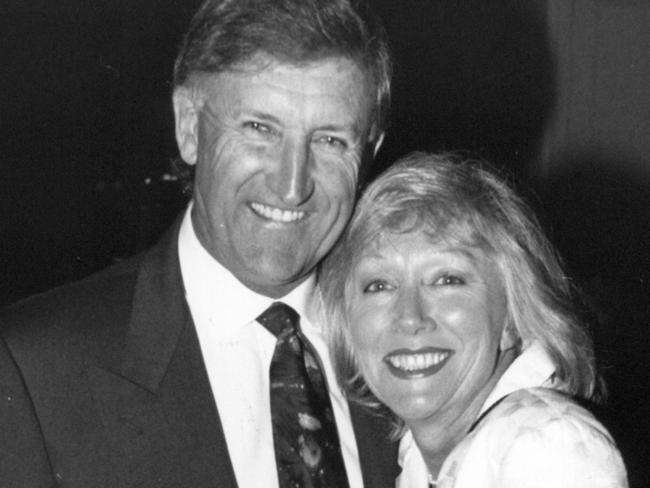
There was plenty of sex going on between politicians, public servants, political staff and journalists. In fact, Parliament House was heaving with conduct that would not be tolerated today – and nor should it have been tolerated then. Several ministers were busted having sex with staff in the back of ministerial cars. Another minister had sex with a woman on the cabinet table, it was reported. The headline: “Yes, yes, oh yes Minister”. The only minister with access to the cabinet room was Hawke. The code among journalists was that the private lives of politicians were strictly off limits. Such things were not reported unless they impacted on their public duties.
Brown recalled taking Hawke to Jupiter’s Casino after it opened in 1985. “There was a woman who was all over Bob and he wanted to get away with her,” Brown recalled. “Everybody was watching. I had to drag him out of there.” In 1986, Hawke was in London. Brown had been having an affair with a young woman who worked in Parliament House, and Hawke knew she had returned to England. “I’m here on my own,” Hawke said by phone from London. “Have you got her number?” Brown said he would try to find it, but he had no intention of passing it on to Hawke and rang back to say she had gone on holiday.
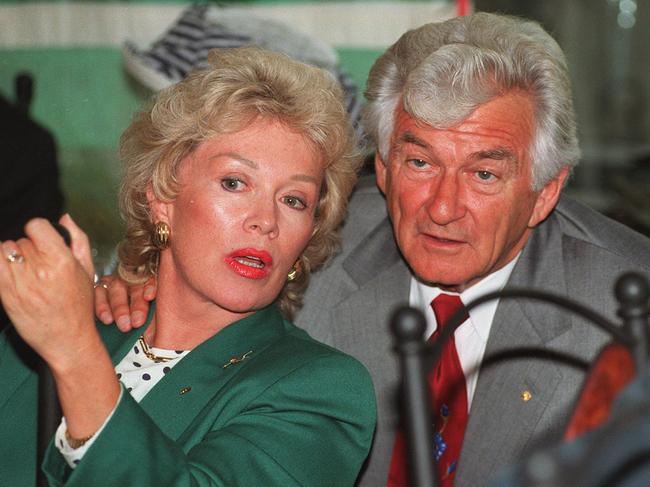
In 1988, Hawke and Brown attended the Australian Wool Corporation’s showcase of designs at the Sydney Opera House. “He fell in love with this Irish model,” Brown recalled. The next day Hawke and Brown played eighteen holes at Royal Sydney Golf Club, and Hawke pestered Brown to track her down. He eventually got her on the phone in the clubhouse, but she told Hawke she was heading back to Ireland so could not meet up. “He was the keenest chaser of women I’ve ever seen,” Brown said.
Hawke’s dangerous liaisons were known to his security detail. They had little option but to acquiesce, because they needed to know where he was at all times, and that he was safe. Roger Martindale, who headed Hawke’s security team from 1983 to 1990, said they sometimes drove him to meet lovers because they did not want him using a Commonwealth car that would draw attention. “We were all adults,” Martindale explained. “He just expected discretion from everybody.”
Not all of Hawke’s staff were aware of what was going on. Barrie Cassidy, press secretary from 1986 to 1991, realised only later that Hawke had been having affairs. “It went on but I wasn’t aware of it,” he said. But he thought something was odd when the prime ministerial entourage would arrive at Sydney airport and the staff would file into cars. “Often we would get to a roundabout at the Sydney Cricket Ground and [his car] would go right and the rest of the convoy would keep going,” he said. “He did have this habit of calling on Peter Abeles quite often in Sydney, but I discovered later that it wasn’t always Peter.”
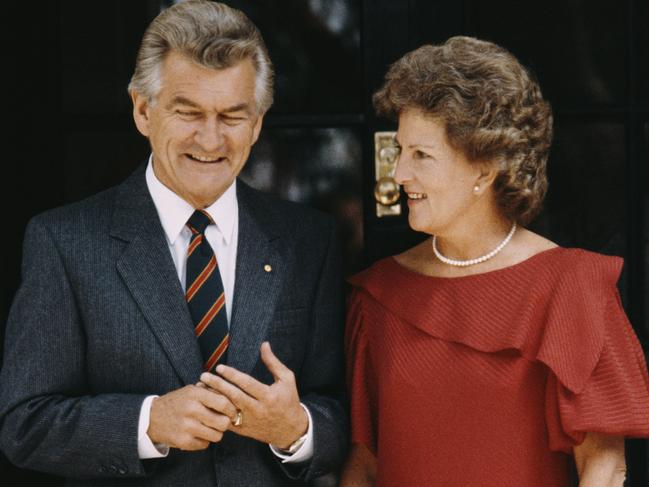
Hawke’s longest on-and-off affair was with Jean Sinclair, who had become his personal assistant when he was ACTU president in 1973.
It continued during the prime ministership. She was married to Angus Sinclair, later the dean of the Faculty of Economics at Monash University, but they lived in different cities. She knew how to handle Hawke. Sinclair did not flinch when giving tough advice, and Hawke trusted her implicitly. She had a calming influence and a warm smile, was a shrewd judge of character and generous towards others.
Political adviser Bob Sorby recalled Hawke “would talk about women in a way that would not be acceptable today” and acknowledged “he did have affairs” while he was prime minister. Sorby, who was on staff from 1986 to 1988, recalled the relationship with Sinclair. “She had a flat and once or twice a month Bob would go off and then he would be back,” Sorby said. “Very discreet.” Bob Hogg, who worked for Hawke from 1983 to 1986, was also aware of Hawke’s affair with Sinclair. Asked if it continued while he was prime minister, Hogg said: “[It] could only have been sporadic.”
Martindale was aware of the Hawke-Sinclair relationship. “It was generally known that he and Jean had been having an affair for some time,” he said.
Sinclair died after a long battle with cancer in 1991. Hawke visited her several times in hospital before she died. Speechwriter Graham Freudenberg, who was close to Sinclair, described her as Hawke’s “right arm”.
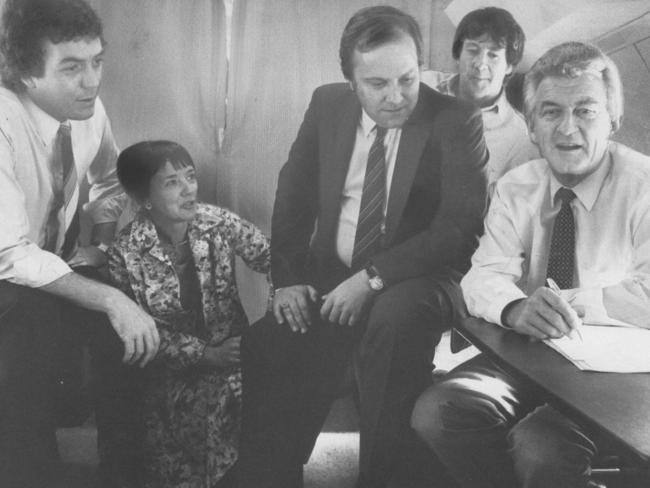
Hawke was too distressed to speak at Sinclair’s funeral. He had lost more than just a trusted colleague and confidante. He had lost a lover.
D’Alpuget’s affair with Hawke had begun in 1976 and continued while she wrote his authorised biography (published in 1982). It resumed when he was a shadow minister and continued until around the time he became Labor leader in 1983.
It ended when she went to Israel to begin writing a new book, then restarted around mid-1984, when Hawke’s daughter, Rosslyn, was revealed to have a heroin addiction. “He was surrounded by people, police guards and so on and so forth, so getting in to see him at the Lodge was the only place that we could meet,” she recalled. But with Hawke in emotional turmoil, facing an election campaign and unwilling to share his innermost thoughts, the affair broke off. D’Alpuget thought it was over for good. At this point in his life, Bob needed Hazel, not Blanche.
But in 1986, Blanche was back. Hawke agreed to an interview with Blanche for The Age. It caused a stir among the staff, who lined up to look through the peephole from the principal private secretary’s office into the prime minister’s office.
“The chemistry between them was extraordinary,” recalled deputy press secretary Paul Ellercamp. But in her article, Blanche wrote that she was shocked by what she saw. “There was a deep loneliness in him,” she thought. The prime minister’s biographer reported that he was a diminished figure. The interview was dynamite. Here was Hawke’s biographer — and, many assumed, lover — saying he had lost his mojo. It was seized upon by Paul Keating to argue that Hawke should hand over the prime ministership. The affair did not resume then, however.
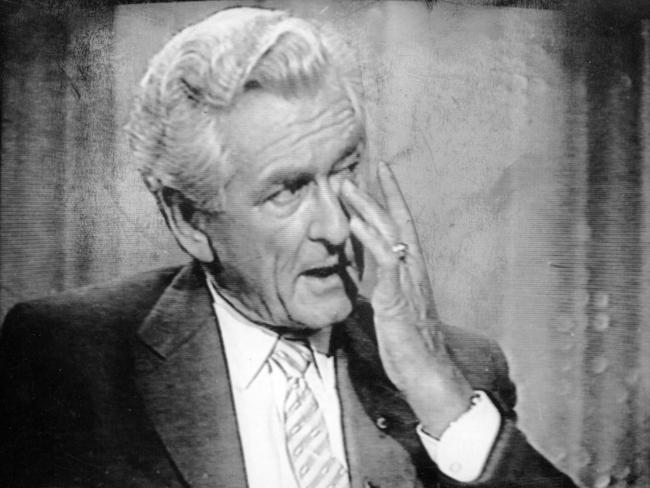
D’Alpuget divorced her husband that same year. After the Kirribilli Agreement was made with Keating in 1988, guaranteeing several more years as prime minister without challenge, Hawke decided to take more risks. “[Hawke] had called Keating’s bluff and won,” d’Alpuget later wrote.
Hawke resumed his affair with d’Alpuget. He tracked her down via former minister Susan Ryan and they met at a mutual friend’s house in Sydney. D’Alpuget wore a red wig and a stetson hat. “[We] rushed into each other’s arms,” she recalled. “We laughed at ourselves, and with delight and relief that we still loved each other.” The great love affair regained its old rhythm. They often met clandestinely, arranged by a go-between, at her apartment or that of a mutual friend. The secrecy intensified the romance. The affair would continue for the rest of Hawke’s prime ministership, and beyond.
But Hawke was still seeing other women at this time, while d’Alpuget had two other boyfriends, including one she was particularly keen on. The idea of a longer-term commitment — marriage — was not mentioned.
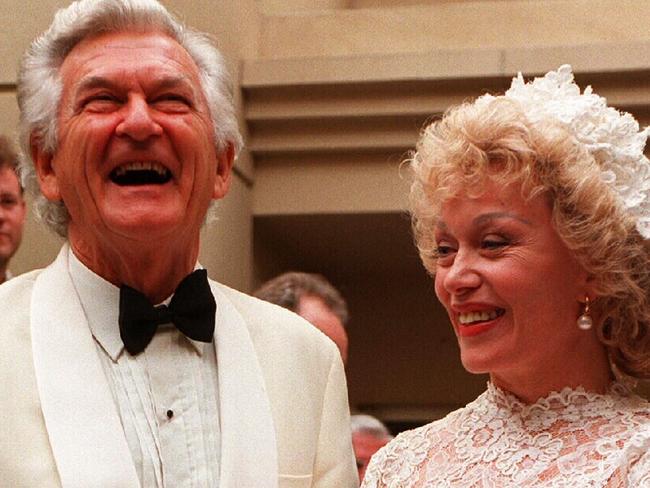
Press secretary Grant Nihill often helped “facilitate’” Hawke’s secret rendezvous. “[He was] genuinely in love with Hazel and genuinely in love with Blanche,” Nihill said. Hawke would tell Nihill that he was seeing Blanche, often in Sydney, and asked him to come along.
“Bob and I were close,” Nihill said. “Someone always had to be with him, and that someone was me in those final years. He wouldn’t go anywhere on his own.” Nihill would wait in another room while they had sex.
Hawke refused to accept that he was an alcoholic and would never have accepted that he had an addiction to sex.
The World Health Organisation has diagnosed this as Compulsive Sexual Behaviour Disorder. Unusual genetic activity which leads to high levels of oxytocin, known as the “love hormone”, seems to compel certain people to lose control and perform risky sexual activities.
Asked if Hawke had a sex addiction, d’Alpuget responded: “I think so. Because sex will calm people down, and he was a very highly strung man. At the end of a day of intense activity, he somehow had to let off steam, as it were, and there’s nothing like a roll in the hay or five to do that.”
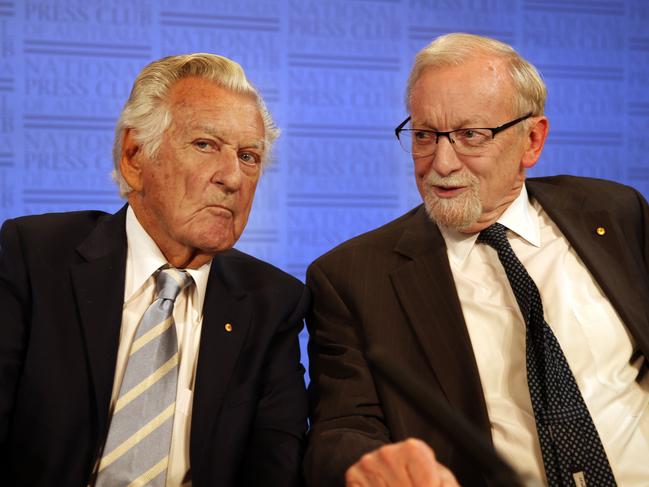
Hazel knew about Jean and Blanche, and probably others. “The affairs were, in a way, the least of the worries,” her close friend Wendy McCarthy said. “The alcohol mattered more than the affairs. She would not have been happy about it but there was nothing she could do about it. She was resigned to it.”
Several of Hawke’s ministers were aware of his extramarital relationships. Some witnessed women arriving and leaving the Lodge. They could not have cared less about Hawke’s private life, and none thought it impacted on his judgment as prime minister or on the carrying out of his public duties and responsibilities, but many were appalled by his treatment of Hazel.
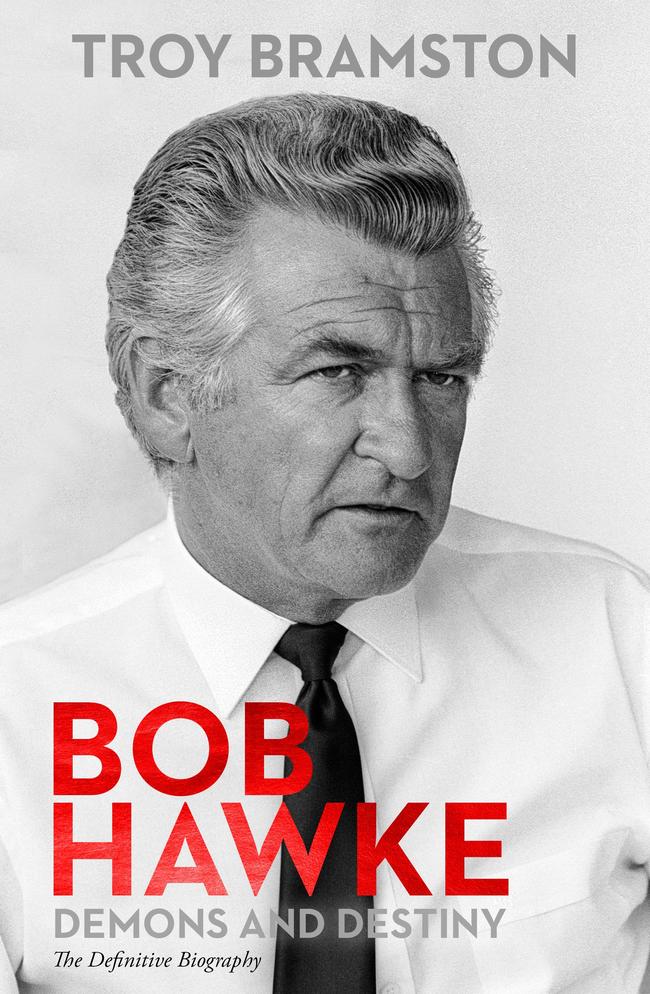
Gareth Evans said: “Hazel was salt of the earth and Hawkey just didn’t recognise what a treasure he had in terms of the support she had given him, the personal loyalty she had given him and the way she brought up the kids.” Brian Howe also took a dim view. “His treatment of Hazel was abominable,” he said. “And not just in the early days. I mean, over a very long period of time. Hazel was a fantastic person.”
Hawke demanded the highest standards of public accountability from ministers, but never questioned their personal morality. There was no double standard. But he was determined to act on anything that risked the integrity of his government, whether it was excommunicating David Combe for drunken fantasies about getting rich from lobbying, sacking Mick Young for not declaring a Paddington Bear, or demanding that Brown resign over allegations he had misled parliament over contracts for Expo ’88.
But Hawke did turn a blind eye to his own personal indiscretions, which risked the moral integrity of his government. “Anything that had a whiff of overt lack of integrity, mates were disposable,” Evans said. “But getting pissed and gambling, and f..king other women, was not something that troubled him.”
It is a damning judgment.
This is an edited extract from Bob Hawke: Demons and Destiny by Troy Bramston (Viking, $49.99), out March 1.



